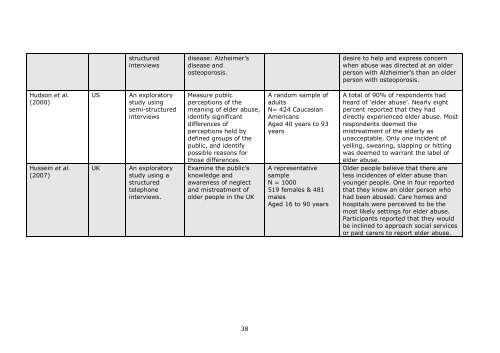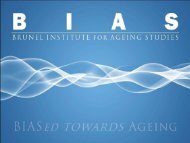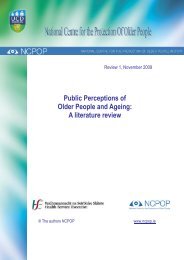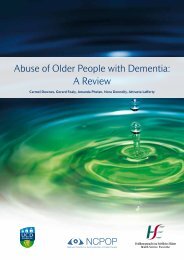Public Perceptions of Elder Abuse - Global Action on Aging
Public Perceptions of Elder Abuse - Global Action on Aging
Public Perceptions of Elder Abuse - Global Action on Aging
You also want an ePaper? Increase the reach of your titles
YUMPU automatically turns print PDFs into web optimized ePapers that Google loves.
structured<br />
interviews<br />
disease: Alzheimer’s<br />
disease and<br />
osteoporosis.<br />
desire to help and express c<strong>on</strong>cern<br />
when abuse was directed at an older<br />
pers<strong>on</strong> with Alzheimer’s than an older<br />
pers<strong>on</strong> with osteoporosis.<br />
Huds<strong>on</strong> et al.<br />
(2000)<br />
Hussein et al.<br />
(2007)<br />
US<br />
UK<br />
An exploratory<br />
study using<br />
semi-structured<br />
interviews<br />
An exploratory<br />
study using a<br />
structured<br />
teleph<strong>on</strong>e<br />
interviews.<br />
Measure public<br />
percepti<strong>on</strong>s <str<strong>on</strong>g>of</str<strong>on</strong>g> the<br />
meaning <str<strong>on</strong>g>of</str<strong>on</strong>g> elder abuse,<br />
identify significant<br />
differences <str<strong>on</strong>g>of</str<strong>on</strong>g><br />
percepti<strong>on</strong>s held by<br />
defined groups <str<strong>on</strong>g>of</str<strong>on</strong>g> the<br />
public, and identify<br />
possible reas<strong>on</strong>s for<br />
those differences.<br />
Examine the public’s<br />
knowledge and<br />
awareness <str<strong>on</strong>g>of</str<strong>on</strong>g> neglect<br />
and mistreatment <str<strong>on</strong>g>of</str<strong>on</strong>g><br />
older people in the UK<br />
A random sample <str<strong>on</strong>g>of</str<strong>on</strong>g><br />
adults<br />
N= 424 Caucasian<br />
Americans<br />
Aged 40 years to 93<br />
years<br />
A representative<br />
sample<br />
N = 1000<br />
519 females & 481<br />
males<br />
Aged 16 to 90 years<br />
A total <str<strong>on</strong>g>of</str<strong>on</strong>g> 90% <str<strong>on</strong>g>of</str<strong>on</strong>g> resp<strong>on</strong>dents had<br />
heard <str<strong>on</strong>g>of</str<strong>on</strong>g> ‘elder abuse’. Nearly eight<br />
percent reported that they had<br />
directly experienced elder abuse. Most<br />
resp<strong>on</strong>dents deemed the<br />
mistreatment <str<strong>on</strong>g>of</str<strong>on</strong>g> the elderly as<br />
unacceptable. Only <strong>on</strong>e incident <str<strong>on</strong>g>of</str<strong>on</strong>g><br />
yelling, swearing, slapping or hitting<br />
was deemed to warrant the label <str<strong>on</strong>g>of</str<strong>on</strong>g><br />
elder abuse.<br />
Older people believe that there are<br />
less incidences <str<strong>on</strong>g>of</str<strong>on</strong>g> elder abuse than<br />
younger people. One in four reported<br />
that they knew an older pers<strong>on</strong> who<br />
had been abused. Care homes and<br />
hospitals were perceived to be the<br />
most likely settings for elder abuse.<br />
Participants reported that they would<br />
be inclined to approach social services<br />
or paid carers to report elder abuse.<br />
38









